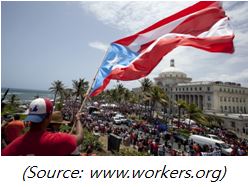Puerto Rico's Colonial Status
Written by Dae-Han Song (chief editor, World Current Report)
Puerto Rico, a former territory of Spain, became a US territory after Spain’s defeat in the Spanish-US War. The independence and liberation (including armed) struggles that followed led to its current official status as a “commonwealth” and a “free associated state” [1] with its own constitution and government. Yet, despite such identity, recent developments confirm that Puerto Rico is a colony of the United States.
The first blow to Puerto Rico’s sovereignty was a June 9th US Supreme Court ruling stating that Puerto Rico has even less sovereignty than a US state. The ruling was on a case in which Puerto Rico wanted to prosecute a defendant already tried under the US federal law. While US law prohibits a defendant from being prosecuted twice for a crime, it allows prosecution under state law (even if prosecuted under federal law). The Supreme Court effectively ruled that a “free associated state” has less sovereignty than a US state. It explicitly stated that Puerto Rico’s true source of prosecutorial authority resides in the US federal government.
The second blow to Puerto Rico’s sovereignty involves its debt and has far more disastrous consequences to Puerto Ricans already suffering from austerity measures. On July 1st, President Obama signed into law PROMESA (Puerto Rico Oversight, Management and Economic Stability Act). The bill creates a financial control board with broad powers to force Puerto Rico to pay off its over $72 billion debt [2] (its 2015 GDP was $103.1 billion) to wealthy Wall Street hedge funds. Seven of the board members will be chosen by the US [3]; one non-voting member, by Puerto Rico. The body would have extraordinary powers to decide the daily lives of Puerto Rico’s people, but would not be accountable to its people, laws, or Constitution. It will reduce the minimum wage for young people (those under 25) from $7.25 to $4.25. It will also institute hiring freezes and approval for contracts over $10,000. It would restructure the debt for the “best interest of creditors.” It would effectively control the country’s budget, revenues and operating. These measures will effectively suck dry Puerto Rico’s economy by further fueling outward migration (which erodes its tax base and work-force) in order to make Wall Street speculators even wealthier. [4] To add insult to injury, PROMESA will “transfer” the island municipality of Vieques back to Puerto Rico without cleaning the massive contamination from 60 years of bombing practice.
If there was any doubt, the recent Supreme Court ruling and financial control board make it astoundingly clear: Puerto Rico is a US colony.
[This article is based in part on the following articles in Workers World written by Berta Joubert-Ceci: It’s Time to Define Puerto Rico’s Status, Imperialist Control Board to be imposed on Puerto Rico]
- Puerto Ricans have US citizenship but can’t vote in federal elections or for a representative in Congress (where laws such as PROMESA are decided). They effectively have the worst of both worlds: not full citizenship, not full sovereignty.
- The debt is due to Puerto Rico’s economic depression due to: migration from Puerto Rico eroding its tax base, requirements that its goods be transported by US ships (thus increasing prices and making trade with other countries cumbersome), outward migration of companies and production due to NAFTA and the end of preferential tax breaks. http://america.aljazeera.com/opinions/2015/7/the-cure-for-puerto-rico-is-independence.html
- The Speaker of the House of Representatives and the Senate majority leader (both Republicans) would draw up a list of candidates and the President would choose from the list.
- Vulture hedge funds such as Fir Tree Partners and Appaloosa Management have bought Puerto Rico’s debt at 30, 40, 50 cents on the dollar but expect full payment and interest. http://prospect.org/article/how-hedge-funds-are-pillaging-puerto-rico

